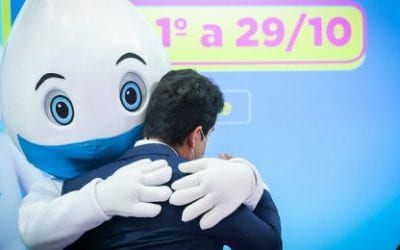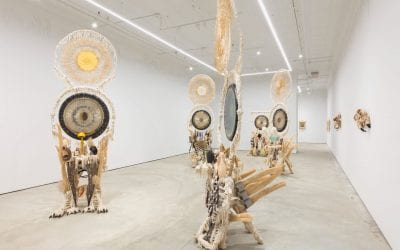Ecuador: From Coronavirus to the Future
Will Humanity Change?
Henry Kissinger, the former U.S. Secretary of State, known as the black monk of global power, in a recent commentary published in the Wall Street Journal, insists on something we have been discussing in recent months: The coronavirus pandemic will change the world order forever.
The great catastrophes in the history of humanity have always led to profound changes in the systems we have designed to survive, flourish and even provide us with the illusion that we can be almost like gods.
In America and the ancient world, it was the gods who caused catastrophes but at the same time those who, after sacrifices and prayers, listened to the complaints of the helpless humans and lifted the divine punishment. In these confrontations between human beings, the warring parties always imagined that God or gods was on their side. It was never known who they were protecting: whether it was the eventual winners who had to assume the high costs for their country and their allies, or the defeated, that they had to learn to survive with the lessons of that defeat.
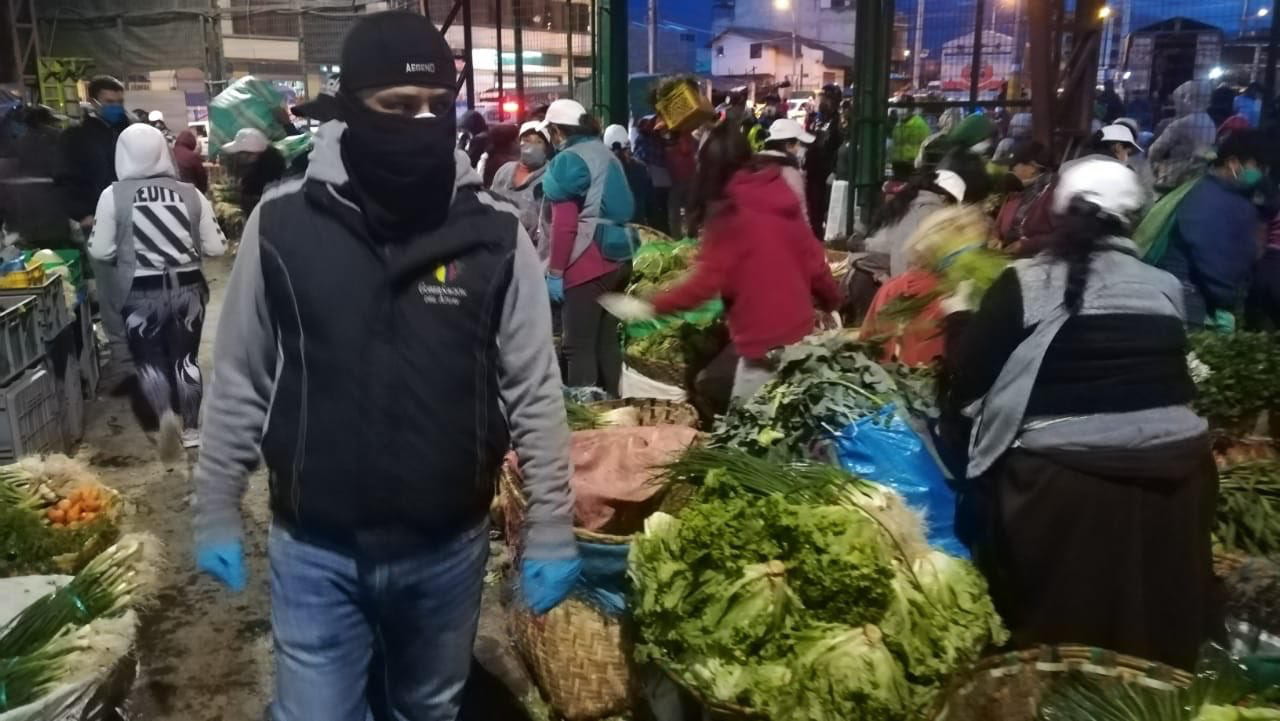
Masked merchants and shoppers in a working-class market. There is now a curfew from 2 p.m. to 5 a.m. throughout the entire country. To leave the house, Ecuadoreans must don masks and gloves. // Vendedoras y usuarios enmascarados en un mercado popular de Quito. El gobierno desde hace 15 días dispuso toque de queda de 2 pm a 5 am en todo el país, y la obligación de que todos al salir de sus casas, llevan mascaras y guantes.
In conflagrations, the attention of rulers and ruled was focused on achieving the defeat of the adversary. They were crises caused by human beings themselves. In overcoming natural disasters, attention was directed to how to counteract those forces that could not be dominated. something similar happened when faced plagues and pandemics.
In Ecuador, as in most countries around the world, this pandemic caught us off guard. Since the beginning of President Lenin Moreno’s tenure, members of his government, the opposition, scholars and intellectuals have been dedicated to analyzing and suggesting solutions to overcome the economic bankruptcy left by the previous government, recover democratic society, restore independent justice and—especially in the last year—to compensate for the drop in the prices of its main export products without affecting Ecuador’s underprivileged classes.
All these efforts were designed to achieve those goals. No one imagined that in a few days or weeks, these urgent goals would be replaced with the struggle for survival in a fragmented country, heavily in debt and with minimal resources.
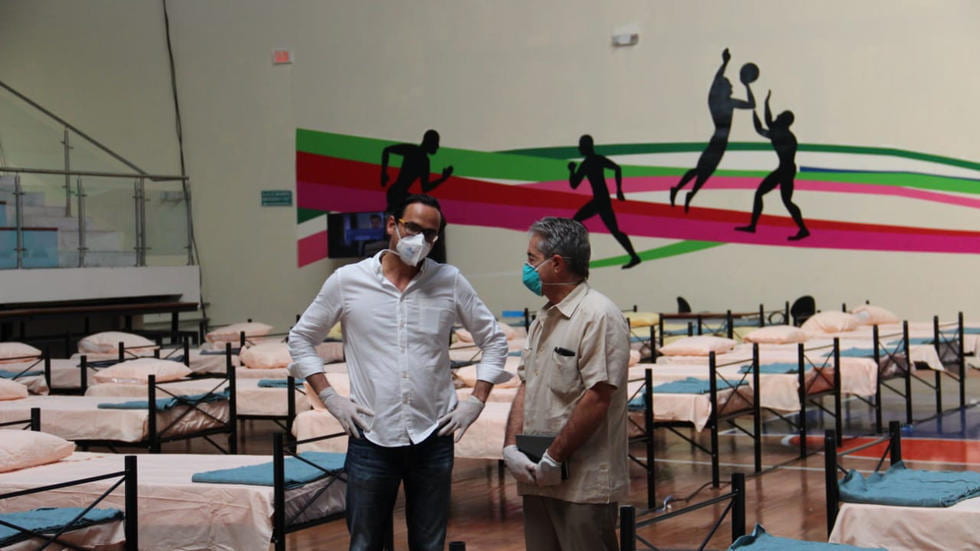
The Ecuadorean Health Minister, together with the Guayas governor, check out provisional installations at the Jimenez Parra Coliseum in Guayaquil to house those with mild to moderate cases of the corona virus. // El Ministro de Salud de Ecuador junto con el Gobernador del Guayas, revisan las instalaciones provisionales para alojar a contagiados leves de las clases populares en el Coliseo Jimenez Parra de Guayaquil.
The long-delayed measures to solve serious economic problems were overshadowed by having to design other alternative ways to also deal with the coronavirus.
The government has tried to prevent the spread of the virus, reducing the number of deaths in a totally skeptical and undisciplined society that had lost its confidence in their leaders, but at the same time, because of the examples given them in the last ten years, thought that economic growth, consumption and hedonism were the paths for personal fulfillment. Ecuadorians did not realize that the country projected by the previous government with its basis in the abundance of money, consumption and indebtedness, had left most of the inhabitants belonging to the most neglected rural and urban classes on the sidelines.
The government has shut itself down. The work carried out with the support of some local governments focuses on solving the daily emergencies that arise. Several responsible social groups, business people and university professors have collaborated to solve these emergencies, focusing particularly on concrete proposals to prepare the future after overcoming the health problem, creating several difficult scenarios in which everybody must act in a process of national unity, rebuilding social fabric and the economy.

Workers from a private company hose down the entrance to a Guayaqui cemetery with disinfectants // Personal de una empresa privada lava con desinfectantes llamadas calle de ingreso a un cementerio de Guayaquil.
Many national and foreign media have tried to narrate the severity of the crisis, the successes and mistakes, the number of victims, the realities of each country and its governments. They have not noticed the immense social gap that has made the poorest— as has been traditional in other tragedies—the ones who bear the brunt of this drama.
Journalism has echoed what has been published on social networks, of visitors and trolls looking for popularity. That old proposal of the ‘90s to count on citizens to become citizen-journalists acting within the community, proved to be a failure, because through social networks, thousands of participants began to act, not to simply and honestly narrate what they saw, but to satiate their whims and obtain revenge against those who considered their enemies trying to gain notoriety.
The media, in general, trying to narrate the severity of the pandemic, given the difficulties encountered in obtaining the different versions of reality, have concentrated on publishingvideos or photos cases that arouse the most amazement and fear.

Food to be donated to the most needy. Private enterprise has donated more than $20 million in supplies. // Grupos de alimentos donados para repartir entre los mas necesitados. La empresa privada ha donado mas de 20 millones de dólares en insumos.
Opinion pieces, on the contrary, offer readers or viewers deeper analysis, but those have not necessarily resulted in increased readership or visibility. The public has obviously become accustomed to information in brief capsules, to being surprised by the impact of images, rather than to meditating on analyses for a positive reaction.
We face, as many thinkers mention, radical changes in our way of being, of living, in our interpersonal relationships. The crisis surprises us; we miss the past and fear the future. This global upheaval gives everyone the opportunity to get back on track.
The gears of humanity will continue to move. We must look deeply into the chain to understand and re build relationships throughout society. Its links must be well tied so that the different social groups must know how to support those who are most in need, seeking balance; offer employment, cover their basic aspirations, hire their services, find unity in this, so that we all must understand the vital need to grow together building a more just and equitable and conscious future.
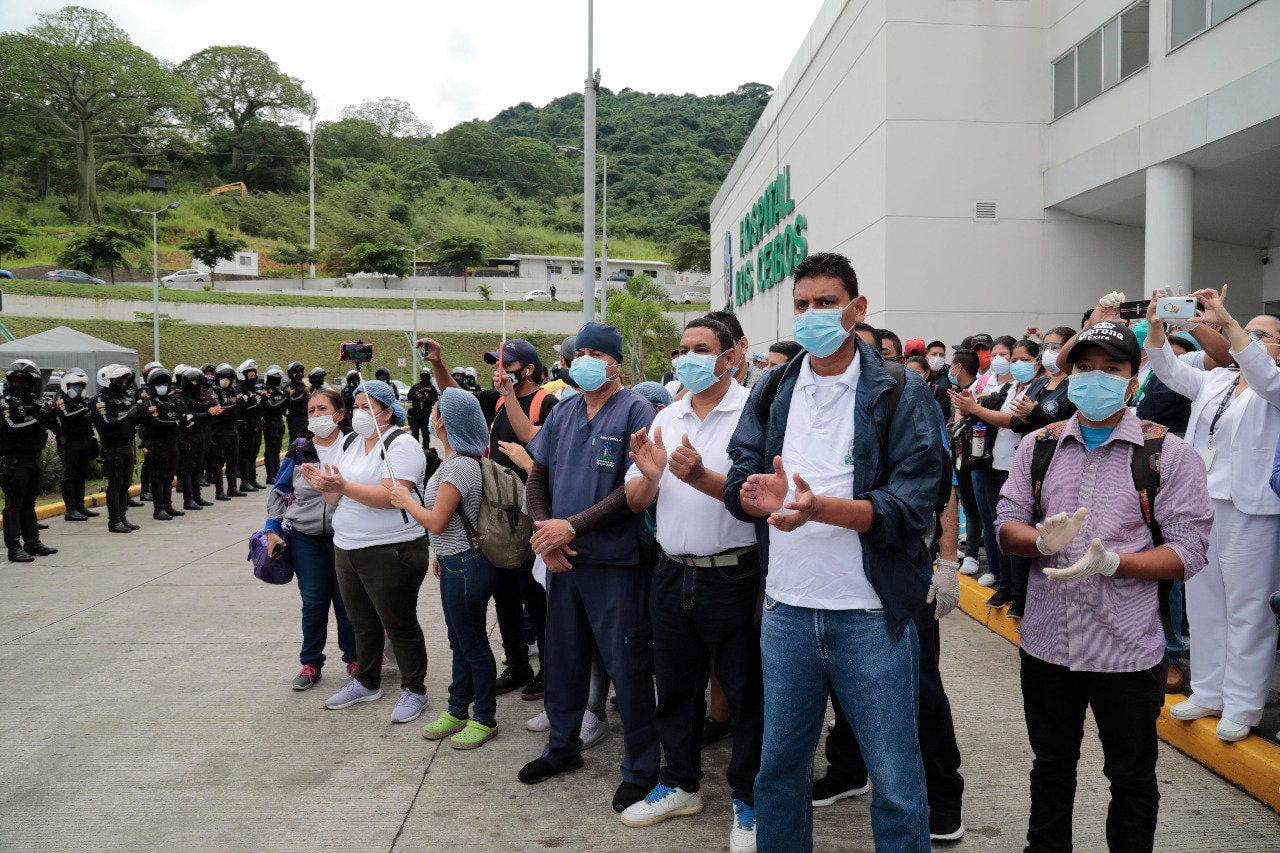
Together with family members, hospital workers at the IESS Los Ceibos Hospital in Guayaquil applaud a patient’s recovery. // Personal del Hospital del IESS Los Ceibos en Guayaquil aplauden junto a familiares, la recuperación de un paciente.
Pandemic, for the first time in history, has put us in front of a large mirror of reality in which we see real faces rather thanmasks, deteriorating institutions, false leaders who are exploiters, weak leadership, all of them cornered in their own deficiencies.
And in the face of this scenario we ask, what is the real meaning of democracy? Democracy has justified many discussions, wars, misunderstandings and blindness. An ideal term that has been replaced by the spectacle, consumerism, the fiction of well-being, as mentioned by Mario Vargas Llosa in Notes on the Death of Culture: Essays on Spectacle and Society.
This pandemic also makes us see the fragility of the media and social networks, reveals the arrogance that has invaded the media with the pretense of being the great informants and shapers of the opinion. Returning to the thoughts of the Peruvian writer, the show supplanted the truth, sensationalism buried objectivity in search of ratings. Ethics has been forgotten for the benefit of short utilitarian visions.
We must return to humility, austerity and honesty, restoring the common sense to reject this obsession that has made us believe men has been ready to become God.
The pandemic is a very hard lesson for this society burdened by haste, the immediacy that has supplanted the ideas, with spectacle. We should rescue solidarity, sensitivity, creativity, imitating those who build in the storm to assess the person as part of the family and the society in time, work and relationships with others.
Ecuador: del coronavirus al futuro
¿Podremos cambiar?
Por Jaime Mantilla
Henry Kissinger, el viejo Secretario de Estado de los Estados Unidos, conocido como el monje negro del poder global, en reciente comentario publicado en el Wall Street Journal, insiste en algo que estamos discutiendo en los últimos meses: La pandemia del coronavirus cambiará el orden mundial para siempre.
Las grandes catástrofes en la historia de la humanidad siempre han desembocado en profundos cambios de los sistemas que hemos diseñado para sobrevivir, desarrollarnos y soñar en que podemos ser casi iguales que los dioses.
En nuestra América y en el mundo antiguo eran los dioses los que causaban las catástrofes pero al mismo tiempo los que luego de sacrificios y plegarias, escuchaban las quejas de los desamparados humanos y calmaban su castigo divino. En esas confrontaciones entre seres humanos, las partes en conflicto siempre imaginaban que Dios o sus dioses estaban de su parte. Jamás se conoció a quien protegían: si a los triunfadores eventuales que debían asumir el costo para sus países y aliados, o a los derrotados, que tenían que aprender a sobrevivir con las lecciones de esa derrota.

Masked merchants and shoppers in a working-class market. There is now a curfew from 2 p.m. to 5 a.m. throughout the entire country. To leave the house, Ecuadoreans must don masks and gloves. // Vendedoras y usuarios enmascarados en un mercado popular de Quito. El gobierno desde hace 15 días dispuso toque de queda de 2 pm a 5 am en todo el país, y la obligación de que todos al salir de sus casas, llevan mascaras y guantes.
En las conflagraciones, la atención de gobernantes y gobernados se centraba en conseguir la derrota del adversario. Eran crisis causadas por los propios seres humanos. En la superación de los fenómenos naturales , la atención se dirigía a cómo contrarrestar las fuerzas que no se podía dominar, algo similar ocurría cuando se enfrentaba a plagas y pandemias.
En Ecuador, al igual que en la mayoría de países del mundo, esta pandemia nos cogió desprevenidos. Desde el inicio del gobierno de Presidente Lenin Moreno, oficialistas, oposición, sabios e intelectuales han estado dedicados a analizar y sugerir salidas para superar la quiebra económica que dejó el gobierno anterior, recuperar la sociedad democrática, restablecer la justicia independiente y especialmente el último año, compensar la baja de los precios de sus principales productos de exportación sin afectar a las clases más débiles de la población.
Todos los esfuerzos iban destinados a esos objetivos. Nadie imaginó que en pocos días o semanas, esos propósitos urgentes por cierto, debían sustituirse con la lucha por la supervivencia en un país fragmentado, sobre endeudado y con mínimos recursos.
Las medidas durante mucho tiempo postergadas para solucionar los graves problemas económicos, se opacaron al tener que diseñar otros caminos alternos para además enfrentar el coronavirus.

The Ecuadorean Health Minister, together with the Guayas governor, check out provisional installations at the Jimenez Parra Coliseum in Guayaquil to house those with mild to moderate cases of the corona virus. // El Ministro de Salud de Ecuador junto con el Gobernador del Guayas, revisan las instalaciones provisionales para alojar a contagiados leves de las clases populares en el Coliseo Jimenez Parra de Guayaquil.
El gobierno ha tratado de evitar la propagación del virus, reducir el número de muertes, en una sociedad totalmente escéptica e indisciplinada, que perdió confianza en sus dirigentes, pero que al mismo tiempo, por los ejemplos que recibió en los diez años anteriores, pensó que el crecimiento económico, el consumo y el hedonismo eran los caminos, para su realización personal. Los ecuatorianos no se dieron cuenta que el país dibujado por el anterior gobierno en base de la abundancia de dinero, el consumo, el endeudamiento, dejaba al margen a la mayoría de pobladores pertenecientes a los grupos rurales y urbano marginales.
El gobierno se ha cerrado en si mismo. La labor que realiza con apoyo de algunos gobiernos seccionales se centra en resolver las urgencias diarias que se presentan. Varios grupos sociales responsables, empresarios, catedráticos universitarios han colaborado para solucionar esas urgencias y enfocado particularmente en propuestas concretas para preparar el futuro luego de superado el problema sanitario, proyectando los difíciles escenarios en que se deberá actuar para, en un proceso de unión nacional, reconstruir el tejido social y la economía.
Muchos medios nacionales y extranjeros han tratado de narrar la gravedad de la crisis, los éxitos y errores, el número de víctimas, las realidades de cada país y sus gobiernos. No han reparado en la inmensa brecha social que ha hecho que los más pobres, como ha sido tradicional en otras tragedias, sean los que carguen el peso de este drama.

Workers from a private company hose down the entrance to a Guayaqui cemetery with disinfectants //Personal de una empresa privada lava con desinfectantes llamadas calle de ingreso a un cementerio de Guayaquil.
El periodismo se ha hecho eco de las publicaciones en redes sociales, por parte de visitantes y troleros en busca de popularidad. Esa propuesta de los años ’90 de contar con la ciudadanía para formar periodistas ciudadanos actuando dentro de la comunidad, demostró sus inconsistencias, pues a través de las redes sociales, miles de participantes empezaron a utilizarlas no para narrar simple y honestamente lo que veían, sino para saciar sus caprichos y venganzas en contra de los que consideraban sus enemigos buscando notoriedad.
Los medios de información en general, por resaltar la gravedad de la pandemia, ante las dificultades encontradas para obtener las distintas versiones de la realidad, han centrado sus esfuerzos en difundir en videos o fotografías los casos que despiertan mayor estupor y pánico.
Los espacios de análisis han sido posiblemente los que mayor profundidad han ofrecido a los lectores o televidentes, pero no necesariamente los que mayor lectoría o visibilidad han logrado. El público se ha acostumbrado a informarse en cápsulas breves, asombrarse por el impacto de la imagen, mas no por la reflexión que el análisis produce para conseguir una reacción positiva.
Enfrentamos, como lo mencionan muchos pensadores, cambios radicales en nuestra forma de ser, de vivir, en nuestras relaciones interpersonales. La crisis nos sorprende, extrañamos el pasado y sentimos temor hacia el futuro. Esta conmoción global nos da la oportunidad para enderezar el rumbo.

Food to be donated to the most needy. Private enterprise has donated more than $20 million in supplies. // Grupos de alimentos donados para repartir entre los mas necesitados. La empresa privada ha donado mas de 20 millones de dólares en insumos.
El engranaje de la humanidad continuará moviéndose. Debemos mirar profundamente esa cadena para comprender y reconstruir las relaciones en toda la sociedad. Sus eslabones deben engarzarse bien para que los distintos grupos sociales sepan apoyar a los que están más necesitados, buscando un equilibrio; ofrecer empleo, cubrir sus aspiraciones básicas, contratar sus servicios, encontrar en esto la unidad, para que todos comprendamos la necesidad vital de crecer juntos construyendo un futuro más justo equitativo y consciente.
La pandemia por primera ocasión en la historia nos ha puesto frente a un gran espejo de la realidad en que vemos caras reales, no caretas, instituciones en deterioro, caudillismos explotadores, débiles liderazgos, todos ellos arrinconados en sus propias deficiencias.
Y en este escenario nos preguntamos, ¿qué significado tiene la Democracia ? Un término ideal que ha justificado muchas discusiones, guerras, incomprensiones y cegueras. La Democracia, ese ideal político por excelencia, ha sido sustituido por el espectáculo, el consumismo, la ficción de bienestar, como mencionaba Mario Vargas Llosa en su libro La Civilización del Espectáculo.

Together with family members, hospital workers at the IESS Los Ceibos Hospital in Guayaquil applaud a patient’s recovery. // Personal del Hospital del IESS Los Ceibos en Guayaquil aplauden junto a familiares, la recuperación de un paciente.
Nos hace esta pandemia además, ver la fragilidad de los medios y redes sociales, desnuda la arrogancia que ha invadido con la pretensión de ser los grandes informadores y formadores de opinión. Volviendo a los pensamientos del escritor peruano, el espectáculo suplantó a la verdad, el sensacionalismo sepultó a la objetividad en busca del rating. Se ha olvidado la ética ,en beneficio de cortas visiones utilitarias.
Debemos volver a la humildad, a la austeridad, a la honradez, restaurando el sentido común para rechazar esa obsesión que nos ha hecho creer que el hombre estaba en camino de convertirse en Dios.
La pandemia es una lección durísima para esta sociedad agobiada por la prisa, el inmediatismo que ha suplantado las ideas, por el espectáculo. Debemos de manera urgente rescatar la solidaridad, la sensibilidad, la creatividad , imitando a aquellos que construyen en medio de la tormenta para valorar la persona como parte de la familia y la sociedad , en el tiempo, el trabajo y las relaciones con los demás.
Jaime Mantilla is the founder of several media in Ecuador, among them HOY, Revista Cosas-Ecuador, Metro de Quito, Metro de Guayaquil, Metro de Cuenca, Diario Popular, Hoy la Radio, TVHoy and the first newspaper website in the Americas , HOYNet, founded in 1992. He was president of AEDEP (the Ecuadorian Association of Newspaper Editors) on several occasions and was president of the Inter American Press Association 2012-2013. He was a member of the Foreign Relations Advisory Board 2002-2006. He was a Knight Fellow Stanford University, 1992-1993. Contact: mantillajaime3@gmail.com
Jaime Mantilla es fundador de varios medios de información en Ecuador, entre ellos HOY, Revista Cosas-Ecuador, Metro de Quito, Metro de Guayaquil, Metro de Cuenca, Diario Popular, Hoy la Radio, TVHoy y del primer portal de periódicos en América, HOYNet, fundado en 1992. Fue presidente de la AEDEP Asociación Ecuatoriana de Editores de Periódicos por varias ocasiones y presidente de la SIP 2012-2013. Es miembro de la Junta Consultiva de Relaciones Exteriores del Ecuador, 2002-2006. Fue Knight Fellow Stanford University, 1992-1993 . Contacto: mantillajaime3@gmail.com
Related Articles
Brazil’s Vaccinated Democracy
In March 2021, former Brazilian president Luiz Inácio Lula da Silva, a current presidential candidate, posed a pointed question in a speech lambasting President Jair Bolsonaro’s Covid-19 response. “Where is our beloved Zé Gotinha?” Zé Gotinha is not a respected public health expert or crisis manager
Broken Land: Climate Change and Migration in Guatemala
Broken LandClimate Change and Migration in Guatemala Santos Istazuy Pérez (right) sits in meditation during a group hike and workshop at a lush farm along with fellow Guatemalans and like-minded people from around the world including Germany and Uruguay. Photo by...
The Gift of Art
My dear friend, Colombian pioneer performance artist, Maria Evelia Marmolejo, (Cali, Colombia, 1958) whom I met during the research for the exhibition Radical Women: Latin…

